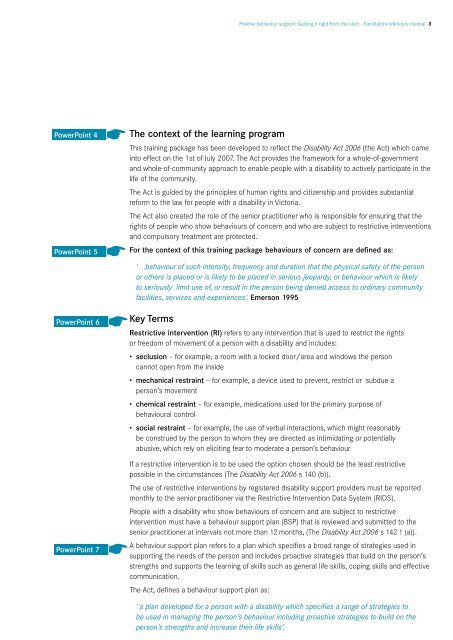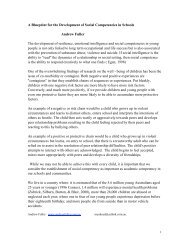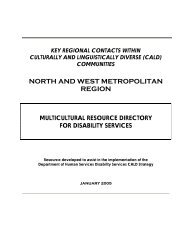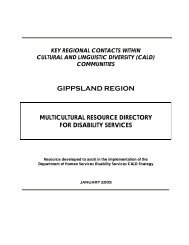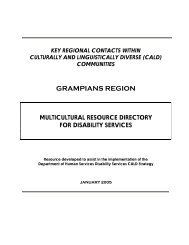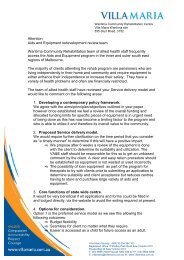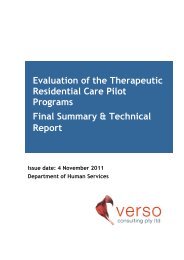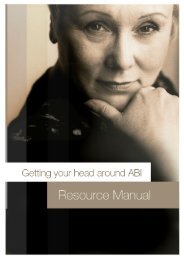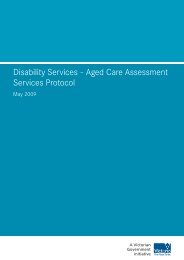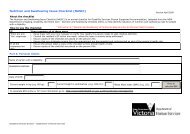Positive Behaviour Support - Department of Human Services - Vic ...
Positive Behaviour Support - Department of Human Services - Vic ...
Positive Behaviour Support - Department of Human Services - Vic ...
Create successful ePaper yourself
Turn your PDF publications into a flip-book with our unique Google optimized e-Paper software.
PowerPoint 4<br />
PowerPoint 5<br />
PowerPoint 6<br />
PowerPoint 7<br />
*<br />
*<br />
*<br />
*<br />
The context <strong>of</strong> the learning program<br />
<strong>Positive</strong> behaviour support: Getting it right from the start - Facilitators reference manual 3<br />
This training package has been developed to reflect the Disability Act 2006 (the Act) which came<br />
into effect on the 1st <strong>of</strong> July 2007. The Act provides the framework for a whole-<strong>of</strong>-government<br />
and whole-<strong>of</strong>-community approach to enable people with a disability to actively participate in the<br />
life <strong>of</strong> the community.<br />
The Act is guided by the principles <strong>of</strong> human rights and citizenship and provides substantial<br />
reform to the law for people with a disability in <strong>Vic</strong>toria.<br />
The Act also created the role <strong>of</strong> the senior practitioner who is responsible for ensuring that the<br />
rights <strong>of</strong> people who show behaviours <strong>of</strong> concern and who are subject to restrictive interventions<br />
and compulsory treatment are protected.<br />
For the context <strong>of</strong> this training package behaviours <strong>of</strong> concern are defined as:<br />
‘…behaviour <strong>of</strong> such intensity, frequency and duration that the physical safety <strong>of</strong> the person<br />
or others is placed or is likely to be placed in serious jeopardy, or behaviour which is likely<br />
to seriously limit use <strong>of</strong>, or result in the person being denied access to ordinary community<br />
facilities, services and experiences’. Emerson 1995<br />
Key Terms<br />
Restrictive intervention (RI) refers to any intervention that is used to restrict the rights<br />
or freedom <strong>of</strong> movement <strong>of</strong> a person with a disability and includes:<br />
• seclusion – for example, a room with a locked door/area and windows the person<br />
cannot open from the inside<br />
• mechanical restraint – for example, a device used to prevent, restrict or subdue a<br />
person’s movement<br />
• chemical restraint – for example, medications used for the primary purpose <strong>of</strong><br />
behavioural control<br />
• social restraint – for example, the use <strong>of</strong> verbal interactions, which might reasonably<br />
be construed by the person to whom they are directed as intimidating or potentially<br />
abusive, which rely on eliciting fear to moderate a person’s behaviour<br />
If a restrictive intervention is to be used the option chosen should be the least restrictive<br />
possible in the circumstances (The Disability Act 2006 s 140 (b)).<br />
The use <strong>of</strong> restrictive interventions by registered disability support providers must be reported<br />
monthly to the senior practitioner via the Restrictive Intervention Data System (RIDS).<br />
People with a disability who show behaviours <strong>of</strong> concern and are subject to restrictive<br />
intervention must have a behaviour support plan (BSP) that is reviewed and submitted to the<br />
senior practitioner at intervals not more than 12 months, (The Disability Act 2006 s 142 1 (a)).<br />
A behaviour support plan refers to a plan which specifies a broad range <strong>of</strong> strategies used in<br />
supporting the needs <strong>of</strong> the person and includes proactive strategies that build on the person’s<br />
strengths and supports the learning <strong>of</strong> skills such as general life skills, coping skills and effective<br />
communication.<br />
The Act, defines a behaviour support plan as:<br />
‘ a plan developed for a person with a disability which specifies a range <strong>of</strong> strategies to<br />
be used in managing the person’s behaviour including proactive strategies to build on the<br />
person’s strengths and increase their life skills’.


